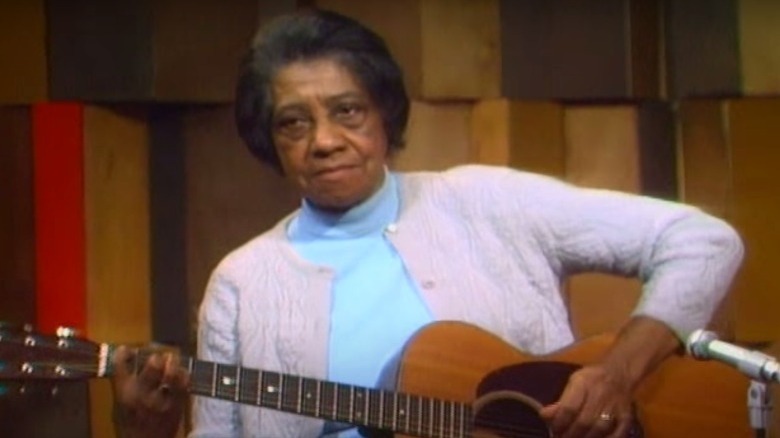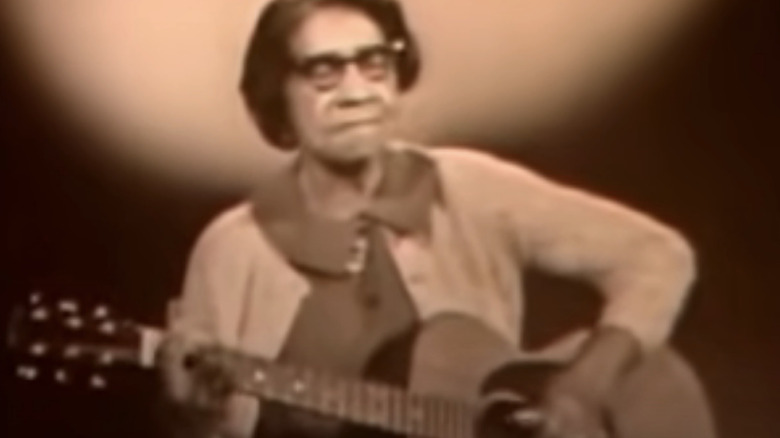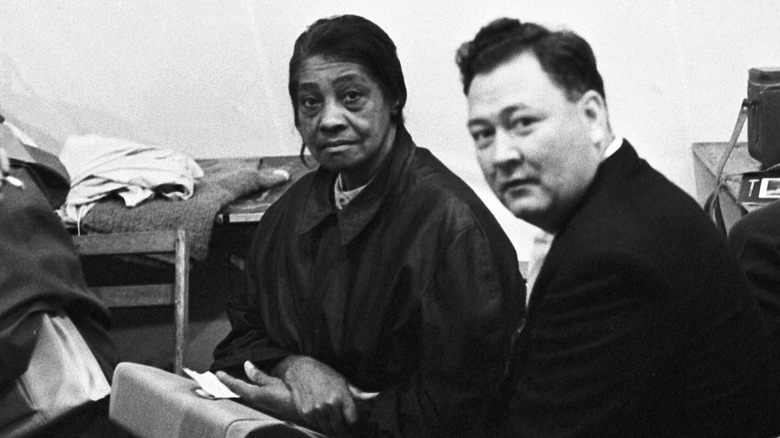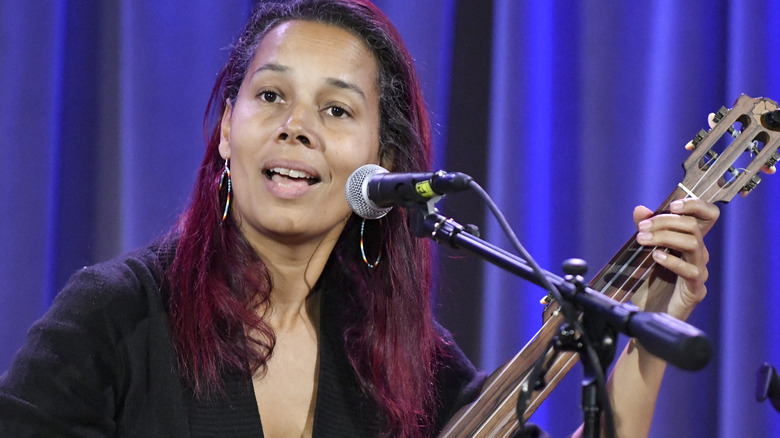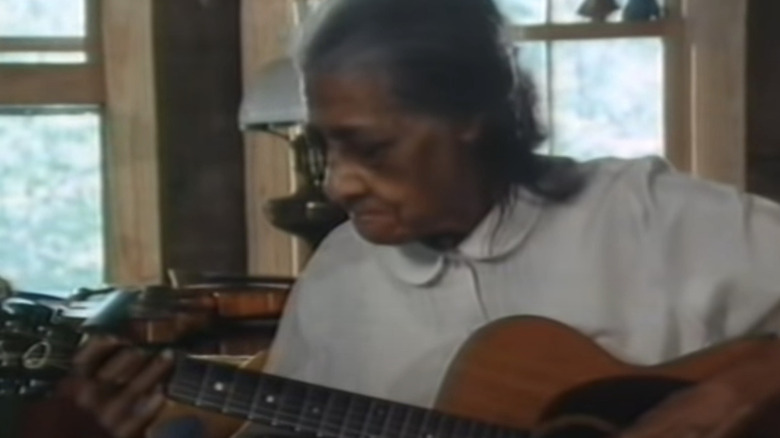Who Was Elizabeth Cotten, The Self-Taught Blues And Folk Musician?
Familiar names like the rock group Duran Duran and rapper Eminem are set to be welcomed into the Rock & Roll Hall of Fame at the 2022 induction ceremony, according to the Rock & Roll Hall of Fame website. Among those notable inductees, though, is an artist who is perhaps somewhat less well known than the others: Elizabeth "Libba" Cotten, a folk and blues musician who died in 1987 at the age of 95. More than three decades after her death, the Hall of Fame will posthumously honor Cotten's contributions to popular music as an "Early Influence" inductee, as the Hall of Fame website elsewhere notes.
Born Elizabeth Nevills around 1893 in North Carolina, it's unlikely, perhaps, that you'll ever hear a Cotten song on the radio. Her work had an immense influence on rock and pop music, though, and especially on the folk-rock sound of the 1960s, with artists like Bob Dylan, Joan Baez, and the Grateful Dead among her fans. She got her start playing guitar and banjo, and was awarded a Grammy late in life. Among songwriters, musicians, and students of American music history, Elizabeth Cotten is rightfully a legend.
Cotten taught herself how to play
As the Cotten biography posted at Smithsonian Folkways explains, as a young girl in North Carolina, the future folk and blues musician snuck every opportunity to teach herself how to play guitar and banjo using her brother's instruments, despite that being forbidden. Given that she was self-taught — and what's more, she was left handed, learning to play with right-handed instruments — she developed her own way to play guitar, developing a unique picking technique known today as "Cotten style." The first guitar Cotten ever bought cost less than $4, a Stella she purchased at the dry goods store. Nor did she re-string the instruments to accommodate her left-handedness; she simply turned them upside down and played.
Cotten was married at 15 years old and gave birth to a daughter, Lily. As a result, she gave up playing music to focus on family life. With that it seemed like Cotten's career as a musician was over. As Smithsonian Folkways goes on to note, though, Cotten was working in a Washington, D.C. department store when one day she came across a lost child. That child was Peggy Seeger, half-sister of folk musician Pete Seeger and the daughter of Charles and Ruth Crawford Seeger, both of whom were folk musicians and music scholars, per The American Folklife Center of the Library of Congress.
The songwriter worked for the Seeger family
After helping young Peggy Seeger find her mother, Cotten went to work for the Seeger family in their home, according to Smithsonian Folkways. Much as when she was a child, Cotten had an opportunity to surreptitiously play the Seeger family's gut-stringed guitar. Cotten expected she might be reprimanded for playing their instrument without first asking permission. After she found out, Peggy Seeger was impressed by what she heard: Not only by how well Cotten could play, but also the strength of her songwriting. Tunes like "Freight Train" — the closest thing Cotten ever had to a hit — were written before Cotten was a teenager (via Encyclopedia.com).
With the encouragement of the Seeger family, Cotten's music career began in earnest. As the blues and folk styles grew popular among younger generations at the time, Cotten appeared alongside other legendary blues musicians like Mississippi John Hurt and Muddy Waters the Newport Folk Festival and other major music events. On her passion for playing music, Cotten said (via Encyclopedia.com), "I just love to sing ... I love to get up before people and let 'em hear what I can do." It was also around this same time she played music in the home of the future U.S. President John F. Kennedy, then a U.S. senator from Massachusetts, as Smithsonian Folkways explains. Peggy Seeger had a hit of her own, in England, covering Cotten's song "Freight Train" in 1957, according to NPR.
Cotten released her first album at the age of 62
A popular feature in the worlds of folk and blues music in the 1950s and '60s, Cotten's first album didn't come out until she was older, as Smithsonian Folkways goes on to note. In was not until she was 62 years old, in 1958, in fact, that she released "Elizabeth Cotten: Folk Songs and Instrumentals with Guitar," which was later reissued in 1989 as "Freight Train and Other North Carolina Folk Songs." Those albums came out on the Folkways and Smithsonian Folkways record labels respectively (via AllMusic). Although she saw some recognition for her art, Cotten continued to work as a domestic until she was nearly 80 years old (per NPR).
Around this same time, the Smithsonian also recognized Cotten (above, backstage at the 1964 Newport Folk Festival) as a "living treasure" and a "Master of American Folk Music” (via Folkways). By 1983, Cotten was living in Syracuse, New York, and she performed right up until she died, in 1987. Her last concert was produced by another folk music legend in her own right, Odetta.
Cotten's music has been extensively covered
Though many may not have heard an original Cotten recording, there's a good chance they've heard her songs covered by a number of well-known artists ranging from Bob Dylan to the Grateful Dead, who both do a rendition of Cotten's song "Oh Babe, It Ain't No Lie," according to Wisconsin Public Radio. (A live version of the Dead performing the song is available to hear now on YouTube.) Another contemporary artist known for covering Cotten's song "Shake Shugaree" on her 2015 album "Tomorrow is My Turn" is North Carolina musician Rhiannon Giddens (pictured) (via AllMusic).
Speaking with Rolling Stone, Giddens explained the influence Cotten had on her own music and on her career. When she first heard Cotten, Giddens said, "I was really interested in how she played guitar, too. I'm left-handed, but I play everything right-handed, and I didn't know you could swap the guitar around like she did. I always thought that was so cool ... [F]or me, Elizabeth Cotten represents the untold and countless musicians who were at these crossroads who were, actually, really, a huge part of the fabric of American music." Giddens went on to add, 'She's coming straight out of that incredible cross-cultural soup that can be hard to pin down into anything we call a genre today."
Cotten died after two weeks spent in the hospital
As The New York Times reported in 1987, Cotten died in a Syracuse, New York hospital around the age of 95 (there's some uncertainty about her exact birth year). She was named Syrcause, New York's first "Living Treasure." On Cotten's legacy, critic Daphne A. Brooks told NPR in 2022, "The brilliance of Elizabeth Cotten's music is the music of a Black girl's lifeworld, a Black girl prodigy that wrote songs, who composed music and innovated her own unique style of playing." Cotten's music, Brooks continued, is "... a specific manifestation of her own North Carolina Jim Crow era Black girl desires," as well as her own personal hopes, dreams, and struggles, Brooks added.
Cotten's 1989 Grammy-Award-winning album for best ethnic or traditional folk recording, released when Cotten was 90, is called "Elizabeth Cotten Live." Her recordings have also appeared in a number of other collections and compilations. Though she won a Grammy late in life, she also received other important recognition during her life, such as in 1972, when she won the Burl Ives Award for her contributions to American folk music. Footage of Cotten performing "Freight Train" in the 1960s is posted on YouTube.

